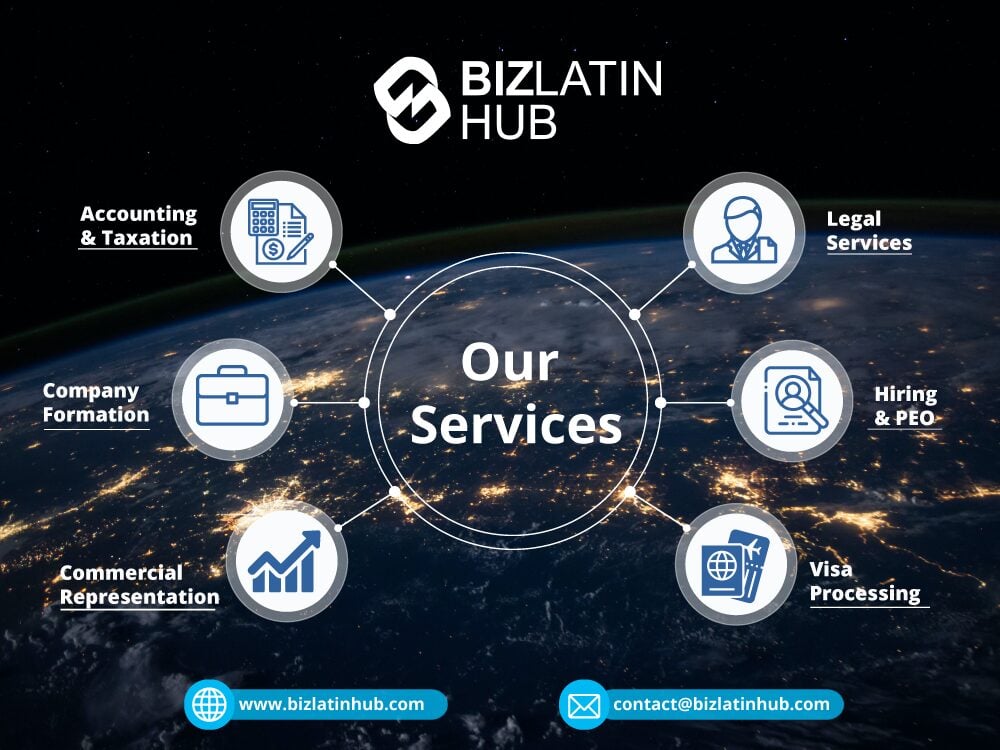In the latest interview for our Q&A series, Biz Latin Hub’s Chelsea Heywood connected with Todd Mercer, Australian Ambassador to Chile and Ecuador, to learn about his experience strengthening Australian relations in the region.
Todd shares his insights on his experience engaging with Latin America, and the development of Australia’s relationships and activity in Chile and Ecuador through the work of the Embassy.
Learn about Ambassador Todd Mercer’s professional diplomatic career and the Embassy in Santiago’s efforts to further develop Australian ties with Chile and Ecuador.
1. You have previously worked in Latin America, as Deputy Head of Mission in both Chile (2003-2006) and Mexico (2012). What drives your interest in supporting Australia’s diplomatic and trade relationships with the region?

Setting aside my personal interest in, and family connection to, Latin America — I studied Spanish at university and my wife is from Chile — I am enthusiastic about promoting Australia’s interests in Latin America, because I can see enormous potential for us to build on what is already a set of positive and substantial relationships.
For trade-dependent countries like Australia and Chile, diversification of our markets is more important than ever as we recover from the economic impact of Covid-19. To illustrate what is possible in Latin America I would point to our experience with education services in this part of the world. In the 20 years to 2018-19, the value of Australian education services in Latin America increased from AUD 40 million to AUD 2.18 billion, and the region’s share of our global education services exports increased from 1.2% to 5.8% over the same period.
“There are few countries which are geographically so far apart and yet share so much in common.”
2. What would you say are unique elements of Australia’s bilateral connections with Chile and Ecuador?
It is safe to say there are few countries which are geographically so far apart and yet share so much in common. Australia, Chile and Ecuador are all resource rich countries, so we have a shared interest in the free flow of goods and services around the world. We also all benefit from the expertise and experience that can turn resources into employment, revenues and wealth.
Australians have helped develop Chile’s mining sector for decades, and we’re in it for the long haul — a future of sustainable mining. BHP, for example, is on track to use 100% renewable energy to power the Escondida and Spence mines by 2025, and to source water from desalination plants rather than aquifers by 2030.
A less visible but vital Australian contribution is the provision of excellent mining services. 140-year-old Orica is active in Chile and across Latin America, with deep experience in the handling of commercial explosives and blasting systems. The recent tragedy in Lebanon reminds us that we have to get this right — it’s an important partnership.
There is also an incredible community of Australian knowledge in Chile — CSIRO, Western Sydney University, the University of Queensland, and UQ’s Sustainable Minerals Institute. Many of them partner with our mining companies to teach the skills that enable innovation in highly advanced industries — think systems design, data analysis and critical thinking. We welcome many Chilean and Ecuadorian students to these and other courses.
I have mentioned some very well-established Australian companies, but the many small and medium businesses are a vital part of our dynamic mining sector, and they are very active in Chile and Ecuador. I am also struck by the growing number of young Chileans and Ecuadorians that are interested in coming to Australia to study and work.
“Australia and Chile have both benefitted from an open global system of free trade… It is in our interests to keep this momentum going.”
In Ecuador, Australian mining companies are looking to get in at the ground floor. The history of Australian mining has been described as the rush that never ended, and there’s an exciting new chapter of that story opening in Ecuador.
Mining is the bedrock of our commercial relationship with Chile, but there’s a lot more that we have in common. Similarities in our climate and geography give rise to common industries, like agriculture, aquaculture, wine; and shared challenges, such as water scarcity and bushfires, large cities and remote towns. The solutions Australian businesses have developed are very applicable in the Chilean market. We’ve got companies such as Rubicon introducing technologies to help with water management, and Macquarie helping to deliver highly developed public-private partnerships for infrastructure.
In July, the Chilean Government announced that its Digital Gateway Project, the first undersea cable across the Pacific from South America, would land in Sydney for onward connection into Asia. Australia is emerging as an important telecoms hub in our region, just as Chile is emerging as South America’s 5G frontrunner. The cable has the potential to make our two countries the digital gateways to our respective regions.
3. Why is Chile a great landing point for Australian individuals and businesses taking their first steps to expand into Latin America?

Chile has long been positioned as the gateway to Latin America — and for good reason. Chile is the ideal starting point for most Australian businesses wanting to break into the region. It is a good testbed to localise into Latin business culture. Many businesses have their key regional decision-makers concentrated in Santiago. Chile’s pro-investment policies, the tech talent visa, highly skilled (and affordable) workforce are all attractive.
The social unrest of late 2019 notwithstanding, Chile has stable long-term economic prospects, clear rules and low corruption. Chile has a strong record over several decades of business-friendly governments. They have had ambitious infrastructure plans, and have followed through on them. Each time I’ve returned to Santiago I’ve been struck by a new toll road or metro line, an airport under construction, the changing skyline.
There’s even more momentum today thanks to the Government’s COVID recovery plan. In his 2020 State of the Union address, President Piñera announced tax incentives and the facilitation of 130 projects worth USD 21 billion adding to existing announcements, a total of USD 34 billion to be spent on physical, social and digital infrastructure in the next three years. Cutting red tape makes it even more enticing for our companies to come to, or expand their project portfolios in, Chile.
Importantly, the Australian business community in Chile provides a strong and experienced support network. An impressive line-up of Australian business attended a recent Auscham webinar on infrastructure opportunities in Chile. Australian state offices such as Global Vic and Trade and Investment Queensland are a great help. And I would highly recommend that businesses looking at Chile get in touch with the excellent Austrade team in the Embassy for support.
4. What key projects is the Embassy working on to further strengthen Australian connections with Chile and Ecuador?
I’ll nominate two key projects of interest to business: international cooperation to boost trade and investment, and science and innovation.
Trade policy is not the easiest subject to talk about right now, with a number of countries challenging the global trading system in different ways, and with currents of suspicion, not always well informed, flowing in many countries. Not to mention the problems of the pandemic. But all this only makes our conversations about international trade and investment more important. If we want to achieve broad-based gains in prosperity and wellbeing in our society, and that’s what I want for Australia, Chile and Ecuador, then business and government around the world will need to stay on our toes, and work together, to sustain and grow the benefits of international trade and investment.
Australia and Chile have both benefitted from an open global system of free trade. No country has more FTAs than Chile, and Australia is right up there too. It is in our interests to keep this momentum going.
Contemporary trade agreements are important for investment settings and investment promotion. For Chile, Australian investment can support the return of the nation’s economy to its pattern of strong and consistent growth seen over the past few decades. Innovative Australian solutions can be easily adapted and applied here in Chile given our shared challenges.
“Outside of mining and agriculture, there is a lot of potential for Australia’s commercial relationship with Ecuador to grow.”
As active members of APEC, Chileans and Australians in government and business have worked closely together to boost economic growth through trade across the world’s most dynamic region. Practical benefits for businesses include better facilitation of trade across borders, the APEC business travel card, and business-friendly rules on open and secure digital trade. We will need more of this kind of cooperation to mitigate and recover from the economic effects of the pandemic.
Australia is proud of our world class scientists and the world-leading work of our national science agency, CSIRO. And we’re delighted that the Government of Chile invited CSIRO to set up its first overseas office here. Its focus areas include mining productivity, aquaculture and data management. Australia and Chile both have big plans for green hydrogen to provide export-ready, sustainable energy, and our scientists are leading the way.
A great symbol of the innovation partnership that’s growing between Australia and Chile is Chile’s undersea cable project. This fibre optic connection from Valparaiso to Sydney will link Latin America and Asia across the Pacific, and put Chile in the box seat for 5G, AI, and the internet of things. Australia welcomes Chile as a partner in keeping the internet open, free and secure; the superhighway of a new sustainable, problem-solving economy.
5. How have the Embassy’s efforts had to adapt to current Covid-19 pressures across the 3 countries?
Like any institution, business or organisation, the Embassy has faced a number of challenges since March of this year. Initially, and working closely with other Australian embassies in the region, we prioritised assisting the thousands of Australians who found themselves stranded in Chile, Ecuador or elsewhere in South America, when their cruise ship was unable to dock or when their flights to Australia were cancelled. Fortunately, the vast bulk of Australians seeking to return home have now been able to do so.
I have been enormously impressed by the resourcefulness, flexibility and resilience of my team at the Embassy. Staff adapted quickly to the new reality of working from home, using different systems and work practices, while at the same time balancing work and family commitments. With very few exceptions the Embassy’s work has continued seamlessly. Most of our meetings over the past 6 months have been held using platforms such as Webex, which has enabled us to progress issues and for me, only having arrived in February, to meet key contacts.
With Covid-related restrictions in the process of being wound back in Santiago, as the Embassy is gradually transitioning to having more staff work in the office. But this experience has taught us a great deal, and in the medium term, I think we will be better for it. Counterintuitively, I feel that our team is now better connected, better coordinated.
6. What would you consider to be the greatest challenge as Ambassador in promoting the Australian brand in Chile and Ecuador?

In the case of Chile, the strength of the bilateral relationship, and our countries’ similar advantages and shared challenges makes it easy to position Australia, collaborate with key stakeholders, and reach the right touchpoints across the industry. Australia is already well recognised for our mining expertise, as a quality education provider and for water management. As I’ve mentioned, Australia and Chile also share new areas of interest around clean energy technology and green hydrogen, natural extensions of the core industry sectors.
In the case of Ecuador – Australian businesses are mainly playing in the mining sector, which is of course at a very different stage of development. We’re seeing lots of the well-established mining equipment, technology and services companies in Chile, make their way north to Peru and then expand into markets like Ecuador – something we support. Outside of mining and agriculture, there is a lot of potential for Australia’s commercial relationship with Ecuador to grow, and this opportunity will be best harnessed by Australian businesses that are already established in the region and looking for diversification. It would be fair to say that among Australian businesses there is less familiarity with opportunities in Ecuador, certainly relative to Chile, but this is changing. The Embassy, in particular our Austrade team, is committed to raising awareness and supporting businesses looking to enter the market.
7. What does the future of Australia’s relationships with these 2 countries look like, and the opportunities for Australian individuals and businesses in this region to come?
Chile continues to be a strong, stable, country in a region whose huge potential has historically been constrained by instability and corruption. Chile certainly faces its own challenges, but continues to promote foreign investment and provide the necessary support for those investments to succeed. The whole world has been hit hard by COVID-19 and its economic impacts, but Chile has shown it can deliver on long-term commitments, and Chile’s long-term outlook continues to be strong. Moreover, the Australia-Chile relationship only continues to mature and strengthen despite these difficult global circumstances.
More broadly, the long term trend towards wealthier societies will reassert itself – Australian interests in mines and wine, agribusiness and aquaculture, smart cities, green cities and infrastructure all have very bright futures here. Australian businesses will be part of the enormous growth to come in Chile, Ecuador and Latin America more broadly.
Covid-19 has caused an increase in virtual interaction, in some ways it’s drawn us closer, and we see opportunities there. But of course, there is nothing like the direct, physical experience of another country. In the three years before the social unrest from October 2019 and more recently the virus, there was a 50% increase in Chileans visiting Australia, and a 20% increase in travel in the other direction. The number of Chileans studying in Australia almost doubled. The Embassy is working to promote a return to these positive trends, and, once international travel resumes, we look forward to more young Chileans enjoying the 3,400 Work and Holiday visas on offer.
There are many bright young people who will create new enterprises and expand existing ones to the benefit of both nations. In Ecuador, the future will see a vastly expanded commercial relationship and the new Work and Holiday visa will go a long way to bringing our countries closer together. But to end where I began: opportunities for Australian individuals and businesses in this region will flow from increased trade and investment. My goal is to help Chile, Ecuador and Australia, governments, business and individuals, become even stronger partners in the international trade and investment that helps generate jobs, raise revenues and improve lives in our countries and across our regions.
Reach out to Biz Latin Hub for business expansion support
At Biz Latin Hub, we work to enable companies expanding into Latin America, including Chile and Ecuador. Our bilingual local and expatriate professionals are equipped to offer our full range of bilingual market entry and back-office services to support executives navigating company incorporation, hiring (including from overseas), trademark, accounting, visa and other needs.
We work closely with Australian institutions to provide guidance to Australian businesses moving into the region. In 2019, Biz Latin Hub received the Australia-Latin America Business Excellence Award in the Small-Medium Enterprise category at the 2019 Australia-Latin America Business Excellence Awards in Sydney, Australia. We also have extensive experience in helping companies around the world expand into Australia.
Work with our trusted experts to navigate the regulatory environment and requirements for businesses in Chile and Ecuador, and position your business for success. Contact us today for more information and a personalized quote.
Learn more about our team and expert authors.






